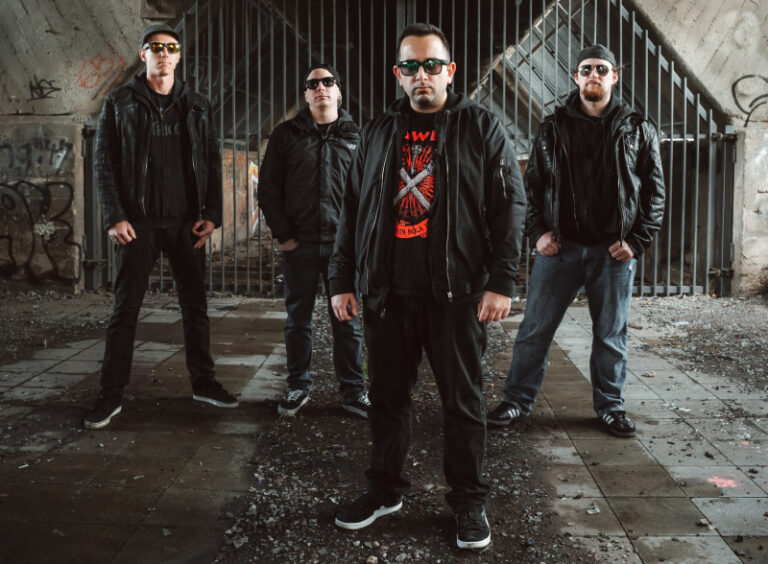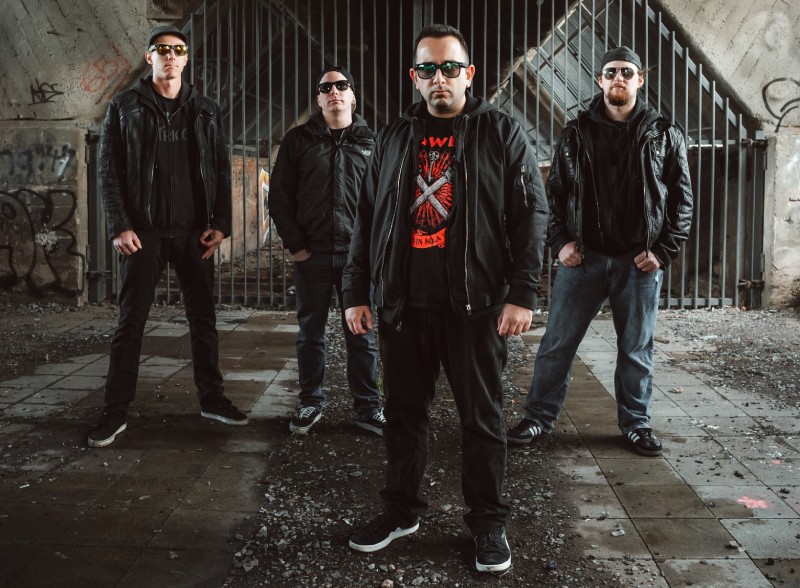You can read this post in:
Português
SMORRAH is a Groove Thrash Metal band from Gelsenkirchen, Germany, that has been conquering the underground scene since its formation in 2017. Influenced by the rich working-class heritage of their hometown, known for its coal mining history, they bring an aggressive and dirty sound, reflecting their roots and life experiences.
So we can get this interview off to a good start, could you tell us a bit about you and how you decided to join the world of heavy music?
Marius: Hello and thank you for having us! We’re SMORRAH from Gelsenkirchen, Germany and we’re playing a dirty and aggressive mix of Thrash, Death and Groove Metal. We founded our very first bands 20 years ago and in 2017 we decided to move forward with a brand-new band and so we founded SMORRAH. Playing in a metal band became a no-brainer since we all got into heavy music at a very young age back in the old days. Awesome times and a lot of good memories. Hopefully there will be many more to come.
What’s the name Smorrah, anyway? I think it’s a very cool name, as it doesn’t sound like anything else and has a nice sonorous feel to it.
Marius: The name comes from a local myth about a female demon called “Smorra”. It suffocates people at their sleep paralysis but it doesn’t want to kill them. It’s a story that have been told by our local coal miners for generations and we keep that heritage alive with our band name.
Which bands or artists have had the biggest influence on the creation of Smorrah’s sound? I notice that there is an allusion to so-called “modern thrash metal”, but at the same time there is a very strong heavy metal vibe.
Pumper: The four members of our band are individually influenced by a wide variety of different bands from different genres and metal sub-genres. When it comes to influences you can actually hear in our music, i’d like to let the listeners decide what they hear in our sound. For me personally, when comes to how i approach the guitar and write riffs, i was heavily influenced by bands like Metallica, Pantera, Slayer, Sepultura, Exodus, Exhorder, Crowbar, Death, Bolt Thrower, Meshuggah and many more.
How does the history and culture of Gelsenkirchen influence the band’s music and aesthetic?
Raphael: I think that the working-class history of the city of Gelsenkirchen influences us a lot. Because we also do a lot of hard work at concerts. In the song “Buried Underneath” we also adress the history of coal mining, for which Gelsenkirchen is known.
What was it like working with Michael Streckbein at Vyrah Studios to produce “Welcome To Your Nightmare”? I say it because I think this record’s production is incredible, because it brings out all the group’s heaviness and strength while still keeping a strong, clean and very well-produced music.
Marius: Yeah, we’re very happy with how that record sounds. We wanted it to be super heavy but it should also sound like we sound in the rehearsal room. Michael did a really great Job.
What inspired you to choose a coal mine as the setting for the music video for “Buried Underneath”? How was the experience of filming in such a unique place steeped in history?
Pumper: To be completely honest, it wasn’t a real coal mine, but rather a training facility for the firefighters that are specialized for mines, but it’s made super realistic and looks like the real deal. We chose the location because the lyrics are about a tragic accident in a coal mine, so we were really stoked to have such an authentic setting for the video shoot.
How do you see the underground metal scene in Germany today? I’ve received a lot of interesting material from bands from there, of all different styles, and I’m happy to see that it’s not just power and black metal, and that there’s a genuine interest in bands that are doing different things.
Pumper: As far as i can see, the scene is constantly growing especially in our local area and i can only agree and I am also glad that there are quite a lot of bands that don’t shy away from experimenting and trying to create their own unique style.
Anyway, if we talk about musical genres, how do you see the thrash metal scene today? I’ve been seeing a renaissance in many new bands that are rediscovering the genre, and others, like you, who are trying to do something that isn’t just a replica of the older bands.
Raphael: I think the thrash metal scene has developed a lot to this day. Many bands sound more modern nowaday, but there are also some who try to sound like the old bands from back then, which I personally like both.
You also can notice that more younger people still like the thrash metal scene today.
We here at Groundcast are Brazilian, so I just had to ask: Do you know any bands from Brazil?
Marius: When it comes to metal from Brasil i’m sure I will always here some voice yelling “Sepultura do Brasil. Um dois três quaaaaaa!” into my ears and then the main riff from “Roots” starts to attack everyone’s neck muscles like a fucking bulldozer! I’ll always like it!
Thank you very much for the interview, we really appreciate you taking the time to answer us. Now it’s your space to leave a message for our readers. Let’s go!
Marius: Thank you and thanks to all metalheads keeping the metal spirit alive! You Rock!
Related Links
https://www.instagram.com/smorrah_official
https://www.facebook.com/smorrah


